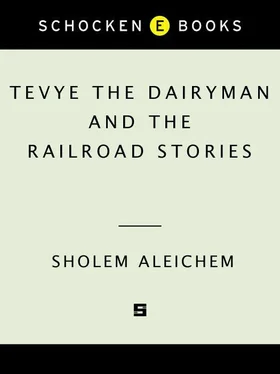“How old would you say I am?” the man asked us.
We all looked at him, trying to guess his age. It was impossible. While his eyes were young, his hair was gray. His heavily lined face seemed on the verge of either laughter or tears. There was in fact something strange about his whole appearance. He was wearing a smoking jacket that was much too long for him, the hat he had on was pushed way back on his head, and the beard on his chin was an oddly rounded goatee. And those eyes of his … ah, those eyes! They were the kind of eyes that once you’ve seen, you’ll never ever forget: half-laughing and half-crying they were, or half-crying and half-laughing … if only he would unburden himself and let the tears out! But no, he insisted on being the very soul of gaiety. A most peculiar fellow.
“Well now, where are we going to find a tenth man?” asked one of us out loud, with a glance at the pince-nezed passenger, who gave no sign of having heard. He simply looked out the window and went on whistling some Russian tune.
“What do you mean, where?” asked someone else. “Don’t we have ten already?” And he began to go around the car with his finger: “One, two, three …”
“Count me out!” said the whistler — in Yiddish.
We stared at him openmouthed.
“You mean you’re not a Jew?”
“I am a Jew. I just don’t happen to believe in such things.”
For a long moment we sat there dumbfounded, looking at each other without a word. The bereaved father alone did not seem put out in the least. With his half-laugh, half-cry of a smile, he said to the whistling young man:
“The more power to you! You deserve a gold medal.”
“I do? What for?”
“To tell you the truth, that’s a rather long story. But if you’ll agree to be a tenth for prayers, so that I can say the kaddish for my son, I promise to tell it to you afterwards.”
With which our good-humored mourner took out a large handkerchief from his pocket, twisted it into a belt, girded his waist in the manner of a pious Jew, turned his face to the wall of the car, and began the afternoon prayer:
“Ashrey yoyshvey veysekho, oyd yehalelukho seloh …”
I don’t know about you, but there’s nothing I like better than a simple afternoon prayer. I prefer it any time to all the do-re-mi operatics that the synagogues are full of on Sabbaths and holidays. And our mourner led us in it with such feeling, with such soulfulness, that we were all touched to the quick — even, I daresay, our conscripted tenth man. Listening to a father pray on the occasion of his son’s deathday is not something that can leave a person cold, especially when the words are chanted in such a sweet, heartfelt voice that they’re like balm to one’s weary bones. And above all — the kaddish. The kaddish! A stone couldn’t help but be moved by a kaddish like that …
In a word, that was an afternoon prayer to remember!
Having finished praying and removed his makeshift belt, the mourner sat himself down opposite our tenth man and, with the same gaily tragic expression as before, commenced his promised story. He stroked his round little beard as he told it, speaking slowly like a man who has time.
“The story I’m going to tell you, young man, is actually not one story but three. Three little stories in one.
“The first story happened to an innkeeper in a village. Once, that is, an innkeeper lived with his wife in quite a large village. There were many Russians in it but no other Jews; they were the only ones. Not that it troubled them; far from it, it meant they could earn a good living without fear of competition. Better rich among Christians, as they say, than poor among Jews … In fact, they lacked only one thing: children. For years they had prayed for them in vain, and this made their life sorrowful. Finally, when they were nearly past childbearing age, God had mercy; the innkeeper’s wife conceived and gave birth to a healthy child. And a male child, too — what happiness! Of course, it was necessary to circumcise the boy. And so, on the eighth day, the innkeeper gladly harnessed his horse to his wagon, drove off to town, and came back with the rabbi, the circumciser, the beadle, and five other Jews. Naturally, his wife had a magnificent banquet ready for them when they arrived. Everything was just fine until the time came for the circumcision — at which point, it was discovered that they were missing a Jew. There were only nine of them. What had happened? Leave it to a country innkeeper: in counting to ten he had made the mistake of including his own wife! You can imagine what a good laugh the guests had. Meanwhile, though, the time was passing; what were they supposed to do now? It was a big village full of goyim, but there was nary another Jew. What a predicament!.. Just then, however, someone looked out the window — and what did he see but a coach heading straight for the inn. In it was sitting a coachman. Well, let it be even a coachman as long as it was a Jew … ‘Welcome, stranger!’ ‘Sholem aleykhemi ’ ‘A Jew! You’re just in time, we need a tenth for a minyan …’ No words can describe the joy there was! Tell me now, don’t we have a great God in heaven? A whole village of goyim couldn’t save the day — along comes a single Jew and sets everything right!
“The second story, my dear fellow, took place not in a village but in a town, and in a solidly Jewish one, too. It happened on the Sabbath, that is, on a Friday night, after the candles had been lit. A father came home from the synagogue, blessed the wine, washed his hands — and just as he was sitting down to eat with his family, a candle had the bright notion of breaking in two. They tried propping it up with the hallah to keep it from toppling over — to no avail; the burning candle fell on the tablecloth and threatened to set it afire. In a minute the whole house would be in flames. What were they supposed to do now? Put it out? But it was the holy Sabbath! By now the neighbors had come running, the whole street was gathered there; a great hue and cry broke out. ‘Jews, we’ll be ruined!’ … Just then, however, someone glanced up the street — and who should be coming down it but Chvedka the goy! ‘Chvedka, serdtse,’ they cried, being careful not to overstep the Law, ‘did you ever see such a queerly burning candle?’ And Chvedka, dumb goy though he was, got the hint at once, spat on his hands, grabbed the burning candlewick between two callused Christian fingers, gave it a pinch — and the fire was out. I ask you: don’t we still live in an age of miracles? A town full of Jews couldn’t save the day — along comes one goy and rescues them all!
“And now I have to tell you my third story. This one concerns none other than a famous rabbi. This rabbi had an only son, an exceptionally capable youngster who was all a rabbi’s son should be. He was married off when still young, given a handsome dowry, and encouraged to study Torah all day long at his father-in-law’s expense. Indeed, that’s just what he did, and everything would have been perfect if there hadn’t been such a thing as the draft. On the face of it, of course, the boy had nothing to worry about: to begin with, he was an only son — and secondly, if it was a problem of money, money was no problem in this case. But the times, the times were bitter! Even only sons were being taken to the army, and ten thousand rubles couldn’t buy a boy’s way out of it. The authorities were ruthless, the doctor had a heart of stone; I tell you, it was a bad lookout. Just imagine, my dear young fellow, the rabbi’s son was stripped to the bone and brought before the draft board — why, never before in his whole life had he been without a hat on his head! And that’s what saved him, because he happened to have a canker there, a real running sore; there was nothing make-believe about it. He must have had it since childhood without knowing it — he had been so stubborn as a boy that he had refused to have his hair washed even once … Well, I needn’t tell you that the draft board sent him packing in a hurry!
Читать дальше












